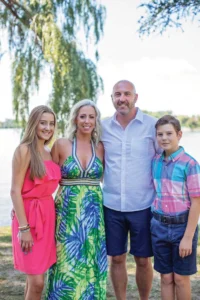Collaborative Research, from bench to bedside: ‘When you know better, you do better’
In December 2020, The Royal announced its new operational strategy: Access, Hope and New Possibilities. President and CEO Joanne Bezzubetz referred to it as the beginning of a five-year conversation. It’s a conversation that opens the door to greater and more meaningful engagement, and reinforces collaboration with clients and families.
What many may not fully understand is how far-reaching the impact of this collaboration can be. When clients and families have meaningful input into the decisions that affect them, play an active role in their own care, and help shape actual research questions, it can transform mental health and substance use health.
“Our clients are the experts,” says Tammy Beaudoin, director of clinical research administration at The Royal. “While we have physicians, researchers, and scientists who study mental health and want to improve mental health outcomes, what they deem as important might not be the same thing that is deemed important to the clients or families we’re working with.”
It’s an essential collaboration, especially given how many people are affected by mental health and substance use health, says Michèle Langlois, chair of The Royal’s Family Advisory Council. “If one person suffers, a constellation of people suffer as well, whether it be in a family, in a workplace or in a community,” she says.
There are many ways people with lived expertise can be involved in research, whether it’s helping develop research questions, being involved in the studies themselves, interpreting the results or disseminating the outcomes. Sometimes it’s as simple as redesigning consent forms, says Peter Winfield, a former client of The Royal and co-chair of a working group dedicated to client and family-oriented research.
Winfield says clients having a voice in the topics that are being researched and the way research studies are structured must be key considerations now, and moving forward. What’s more, “translating research into care is absolutely critical,” he adds. “A lot of good research has been done and we need to work on that and get it into doctors’ and clinicians’ offices.”
Langlois shares the wise words of Maya Angelou: When you know better, you do better. “I think research gives us clues into the knowing better,” says Langlois. “Everyone has a different perspective, but by bringing all the people together you get a more holistic view. I think from a research perspective, when it’s done purposefully by design, you achieve a more balanced view and ultimately, better outcomes.”
Jody and Caitlin’s story

I always made sure to be home before the school bus dropped the kids off. I needed time to check every room, one by one. I didn’t know what I might find.
Would today be the day he couldn’t fight anymore and take his own life?
From the outside looking in, we had the seemingly picture-perfect life. My husband, Jody and I both had successful jobs. We were involved in our community. We had kids that were active in sports. We travelled all over the world. According to the outside world, life couldn’t get any better for us.
What people didn’t see were the days and weeks that Jody couldn’t get out of bed in the morning. The days where he’d come home after work and cry himself to sleep. The days we’d come home from a nice dinner out with friends and he’d have a meltdown for no obvious reason.
I watched somebody that I thought I knew, turn into somebody that I didn’t know.
There were times where I would lie beside him all day, just because I was terrified that if I left, he would take his own life.
But I never gave up hope. We found a physician who referred Jody to The Royal, where we met Dr. David Bakish and a whole team of mental health experts. They saved my husband’s life – they saved our family.

For years, Jody lived in a state of mania…elevated mood, hyperactivity and disorganized behaviour. He was extremely high-functioning, successful, enthusiastic, incredibly outgoing and unstoppable. But he was also overcome by darkness and extreme despair.
For a long time, we minimized the severity and repercussions of Jody’s behaviours. We made excuses for his impulsivity, sudden outbursts and changes in mood. At the time, we didn’t know that what Jody was experiencing were symptoms of bipolar disorder.
I know for a fact that without The Royal, Jody would not be here today. And our family would have been ripped apart.
It’s hard to put into words how beyond grateful we are for The Royal and for generous donors like you. Together, you helped spare two children a lifetime of pain and insufferable grief by not having to grow up without their dad – and for that my family will be forever grateful.

